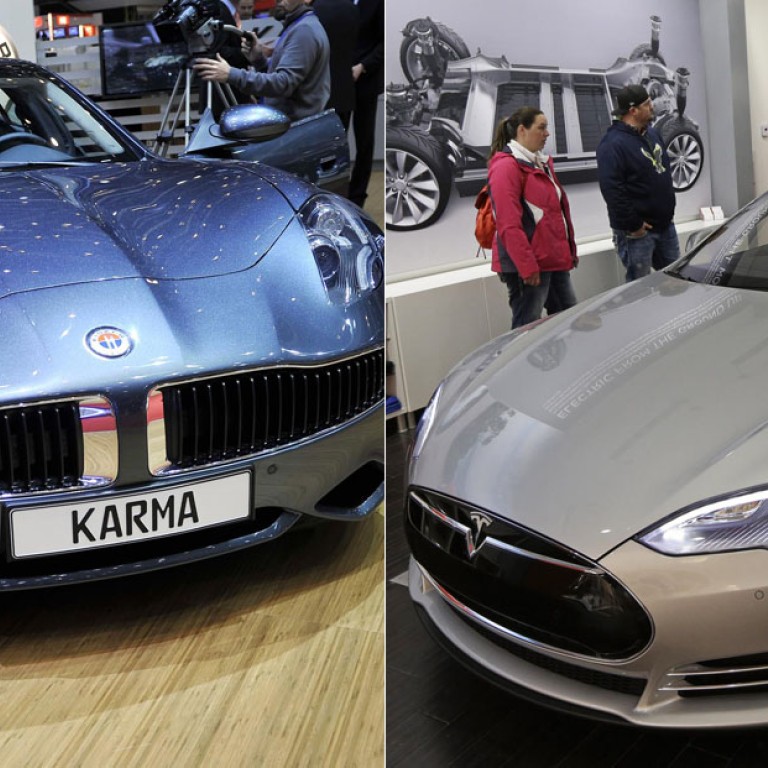
Wanxiang's Lu Guanqiu on a mission to sell electric cars in US
Zhejiang entrepreneur Lu Guanqiu has made it his mission, by the acquisition of Fisker, to sell battery-powered cars in the US, then in China
The Chinese billionaire who bought Fisker Automotive Holdings at a bankruptcy auction is planning to build electric cars in the US, challenging Tesla Motors on its home turf.

"I'll put every cent that Wanxiang earns into making electric vehicles," he said at Wanxiang's headquarters in Hangzhou, Zhejiang province. "I'll burn as much cash as it takes to succeed, or until Wanxiang goes bust."
Lu's plan pits him against the likes of Elon Musk, the chief executive of Tesla, which has added workers to make its US$72,000 Model S. Each mogul aspires to move his company beyond the US to sell lower-emission cars in China - the world's largest car market.
"Fisker brings a unique edge and owning the company no doubt benefits Wanxiang in terms of gaining access to technologies that would otherwise take them years to develop," said Harry Chen, a vehicle analyst with Guotai Junan Securities in Shenzhen.
Lu, 69, made tractor parts during the Cultural Revolution and has nursed a desire to build cars since the 1980s, he said. Now he is worth US$3.1 billion, according to data compiled by Bloomberg. Musk, worth about US$9.2 billion, said he expected China to become Tesla's biggest market.
Wanxiang, China's largest car-parts maker, is hoping to build on the remains of Fisker, whose plug-in hybrid sports car, the Karma, won raves for its low-slung design and rants from critics for its technical flaws. The US$103,000 Karma was made in Finland. Fisker filed for bankruptcy in late 2013, before it could make good on its plan to use a US Department of Energy loan to produce a second model in the US.
Fisker nonetheless sparked a bidding war between Chinese suitors, who would gain about three dozen current and pending Fisker patents. Wanxiang's US$149.2 million offer topped bids from Richard Li Tzar-kai's Hybrid Tech.
The Fisker estate included an abandoned General Motors plant in Delaware, providing Wanxiang an entry point for selling cars in the US - a goal that's eluded Chinese carmakers such as BYD and Great Wall Motor. Geely and Chery have yet to sell their first car in America.
Wanxiang aims to produce the Karma model in the US and later make other extended-range hybrids there, the company said last week, without elaborating.
Lu said he expected Wanxiang to receive a licence to manufacture electric cars in China, without offering specifics. The company already has a permit, granted in October, to build electric buses and trucks there.
"The road is still very long," Lu said. "We want to concentrate for now on manufacturing in the US. If I don't succeed, my son will continue with it. If he doesn't make it, my grandson will."

Wanxiang took its Chinese name from the universal joints - a part used in drive shafts - that it produced.
Lu quit a three-pack-a-day smoking habit to win a bet with a local steel-mill boss in order to secure supplies for his factory, he said, wincing at the memory. He has not smoked since, he said. "I said I would do it, and I did," he said, shifting between the local Xiaoshan dialect and heavily accented Mandarin.
Today, Wanxiang's publicly traded units include vehicle-parts maker Wanxiang Qianchao, seed and fertiliser producer Wanxiang Doneed, beverage maker Hebei Chengde LoLo and Shunfa Hengye, a real-estate developer.
Wanxiang also owns a 3.7 per cent stake in Shanghai-traded Guangzhou Automobile Group, the manufacturing partner of Toyota, Honda and Fiat. The Wanxiang conglomerate earned profit of 7.85 billion yuan (HK$9.86 billion) last year.
Still, Lu has not made good on his dream of making cars.
Wanxiang last year bought most of the assets of Fisker's battery supplier, A123 Systems, which collapsed under the cost of recalling defective power packs. The acquisitions give Wanxiang enough know-how to enter the car industry, said Lu, comparing the deals to "buying brains".
Lu said there are "no shortcuts" to competing against foreign carmakers, adding that a successful company accrues its competitive advantage over time.
"Anyone who says you can make a generational leap is just bluffing," he said.
